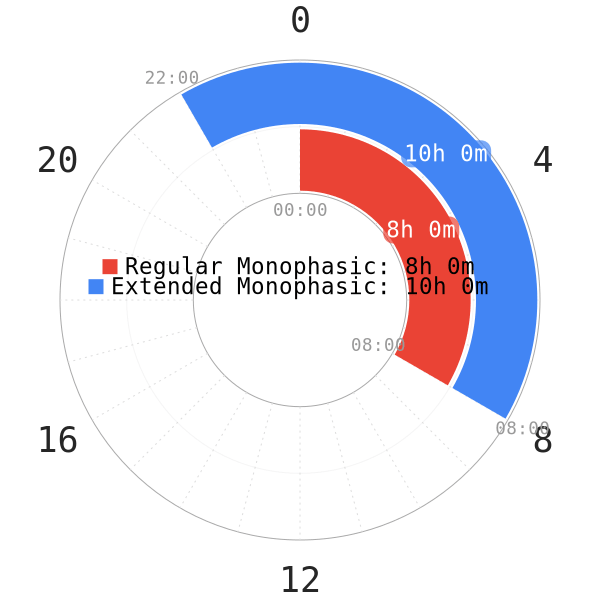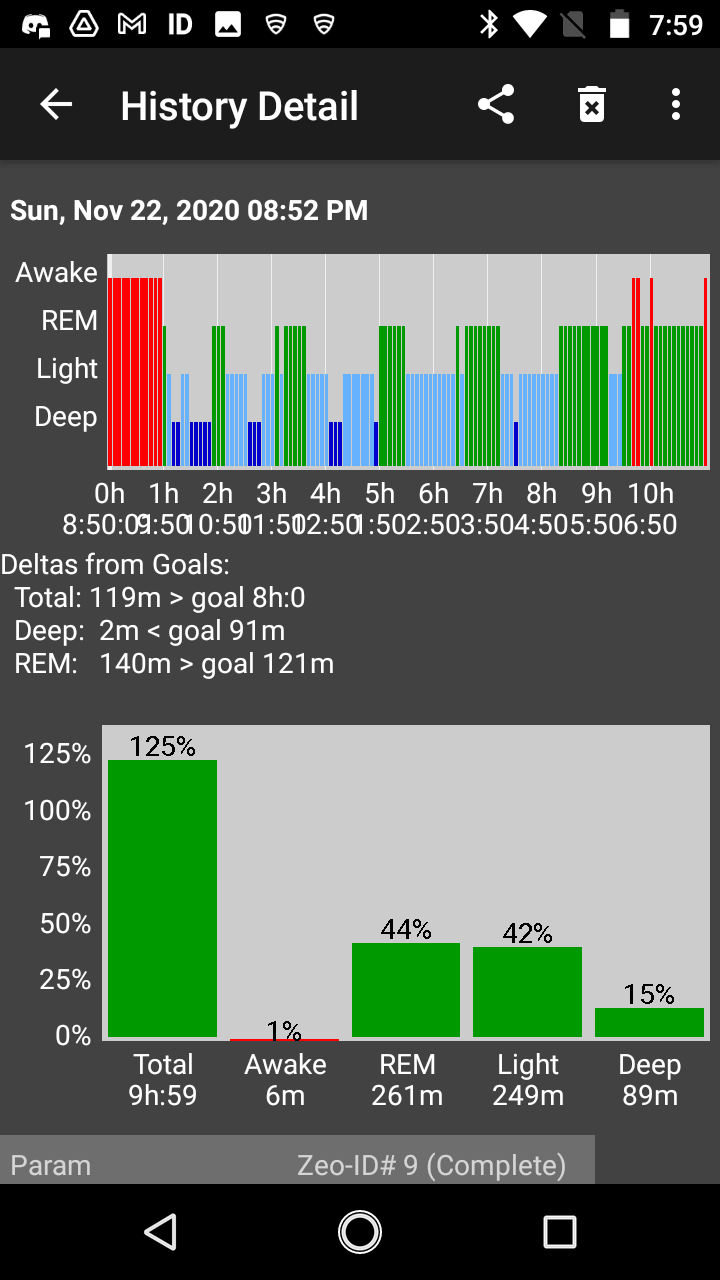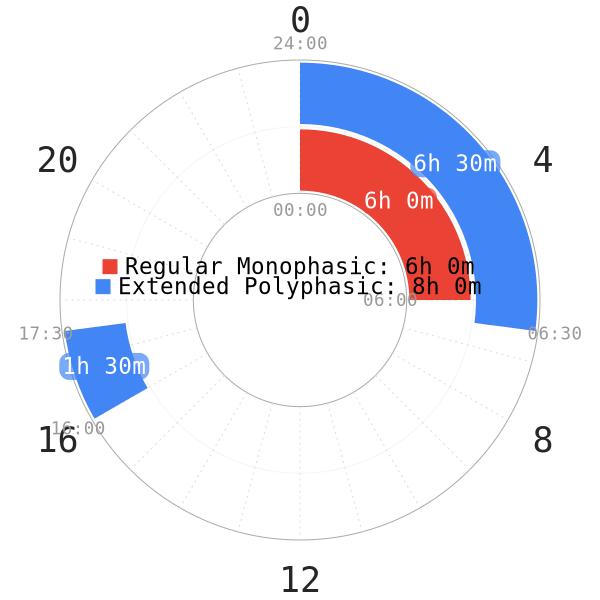Introduction
Sleep extension has long been a unique yet controversial topic, just like pretty much any any sleep topics. We have been familiar with such talks on sleep extension. Below are some examples:
- Parents tell their kids to sleep as much as possible. Usually no less than 8-9h of bedrest each day. However, some radical parents even recommend longer sleep durations for their kids, even if they may be adults.
- Sleep feels so great. I can literally sleep all day and still feel fine. In fact, I can sleep 12h per day if I want to.
- What is the best solution to tiredness and boredom? Just sleep! And sleep as long as you possibly can!
- Man I have such a good dream that I do not want to wake up at all! It seems the longer I sleep the more I dream!
Regardless, these are only a few of certain remarks on the so-called “sleep as much as possible” phenomenon. This post, however, will:
- Examine different types of sleep extension and observe if such spontaneous aforementioned remarks bear any weight.
- Delve into how extending sleep can affect personal dream recall.
- Provide certain implications for polyphasic sleeping and its respective dream contents.
Content
- Monophasic Extension
- Sleep Extension as Recovery from Sleep Debts
- Extended Polyphasic Sleep
Traditional Monophasic Sleep Extension
Definition & Use

The most well-known type of sleep extension is basically lengthening personal monophasic sleep duration. In the Discord community, we refer to it as “Mono-extended“. Excluding those who naturally need at least ~9h of monophasic sleep per day, this type of schedule also has an alternative meaning.
Specifically, average sleepers (~7-8h monophasic) can still extend their sleep purposely. They do so simply by just lying in bed and getting more sleep than usual. For example, a lot of people have reported that they can sleep much longer than they should, or want to. However, that is not something you want to pursue, for these reasons:
- It is well-established that long sleep duration (more than 9h monophasic) increases the risks of all-cause mortality1.
- Furthermore, sleeping too long will induce horrible mood states2.
Extension Influences on Sleep & Dream Recalling
For the focus of this post, we will only mention dreaming aspects and how monophasic extension fares with it. However, note that we only focus on non-sleep-deprived monophasic sleepers in this section. This would mean that they would intentionally extend their sleep duration for the purpose of dream recalling.
Sleep Architecture
In terms of sleep architecture, there have been conflicting conclusions. Thus, continue reading with a grain of salt.
- One dated study concluded, with a small sample size, that extending sleep did not yield more REM sleep alternating with light sleep.
- Rather, participants likely spent more time in light sleep stages2.
- However, they experienced more abrupt sleep interruptions and had trouble staying asleep at times.
- Furthermore, this study did not provide any EEG reports.
- A more recent study, also with a humble sample size, demonstrated that many participants did in fact get considerable amounts of REM duration with sleep extension3.
- Participants notably slept up to 15h total as the experiment entailed.
- REM sleep did account for ~23% of each 3h of sleep extension consistently after monophasic baseline duration was achieved. This observation is also in line with the wonky behavior of REM sleep with sleep extension. Refer to REM Pressure for more information.
- Overall, it is worth noting that participants may have been sleep deprived to some extent upon entering the study. Thus, the findings regarding REM sleep will require further inquiries with bigger sample sizes to confirm.
- Despite the contradiction potentially stemming from individual differences, individuals with longer sleep duration usually spend more time in REM sleep4.
Dream Recall
There is an astoundingly strong consensus on normal, extended monophasic sleep and enhanced dream recalling2-4.
- Because REM sleep duration overall decreases in the extended sleep portions, it may take longer for dreams to occur and recall2. As a result, this can mask the effect of REM sleep in the extended sleep cycles.
- In the case that sleepers would spend most of the time in light sleep in extended sleep durations, their dreams can feel very familiar. Specifically, their dreams likely revolve around normal real-world settings, characters and waking thoughts2.
- Longer sleep duration may also increases the chance of waking from REM sleep4. Moreover, the length of a dream is also related to REM duration before awakening4. This may explain why dreams can feel very long, and so do polyphasic REM naps.
- Stressful events such as worries over the Covid-19 pandemic can also intensify dream contents and dream frequency, especially with sleep extension5.
- People either need to recover from the symptoms or lockdown rules change the habitual lifestyles. As a result, documented cases support the naturally increased sleep duration in this pandemic.
- However, overall self-reported sleep quality declines, with more fragmented sleep. Interestingly, the study explained that interrupted monophasic sleep is a contributor to more dream recall. This remark, once again, strongly hints at how polyphasic sleeping can boost dream recall, with multiple sleep sessions per day.
- Most notably, it is possible to extend monophasic sleep duration to optimize dreaming occurrences2. Therefore, it is a reason why practicing lucid dreaming is totally possible on extended monophasic sleep.
Sleep Extension as Recovery from Sleep Deprivation
Contrary to the normal, monophasic extension type, this type is about excessive sleep as a recovery mechanism from sleep deprivation. Thus, this includes any types of pre-existing sleep deprivations, including incomplete polyphasic adaptations. In the community, monophasic and biphasic schedules are the most common recovery tools. For the most part, the main nocturnal core sleep receives a long extension.

- Under partial sleep deprivation conditions, dream recalling usually becomes more common with extended sleep6. This is because of REM rebound mechanics that result in excessive REM duration in recovery.
- Anecdotally, many polyphasic sleepers in the community have had a sharp increase in dream recall in the first recovery nights. However, their dream recall declines when their sleep duration returns to normal baseline levels.
- Most notably, total sleep deprivation conditions yield different results. Specifically, staying awake for 40 hours almost completely nullified dream recall7. This is because of a steep rebound in SWS, which may override the effects of REM sleep. In return, more SWS often hinders dream recall capability.
Although mostly tentative, recovery from very extreme schedules can also induce similar effects on dream recall as total sleep deprivation. This includes schedules with a very low amount of sleep, such as Uberman and Dymaxion. Three cases of Uberman adaptation failures and other nap-only attempt failures in the community also supported this observation. The prime reason is the massive SWS rebounds.
Extended Polyphasic Schedules & Dream Recalling
Queries
Although it is a very common idea that reducing polyphasic schedules increase dream vividness and recalling, the opposite remains unclear. That is, whether extended polyphasic schedules can also enhance dream recall frequency. For example:
- Does E2-extended (6h core) give better dream recall than regular E2 (4.5h core)?
- How well do non-reducing polyphasic schedules do when it comes to dream recalling?
- Is it possible to use polyphasic sleep to sleep as much as possible?
Extended Polyphasic Sleep
Note that extended polyphasic schedules can still reduce some amount of sleep compared to personal monophasic baseline. Thus, for the purpose of this discussion, we will only focus on schedules with at least the same amount of total sleep as monophasic baseline.
- First, the big majority of success with non-reducing schedules comes from Biphasic sleep. This is because the overall sleep pressure is often too low to sleep more than twice a day. Attempting to do so will often result in ineffective and very shallow naps.
- There have been, still, few successful cases with 3 sleep sessions per day. For example, non-reducing Triphasic and DC1. However, these cases either contain a somewhat high level of physical activity or a somewhat inconsistent sleeping hours. As a result, they require more sleep to rake in enough important sleep stages.
- Other than these, having a nocturnal total sleep way beyond personal monophasic baseline is largely a bad idea. For example, 9h uninterrupted sleep versus 8h regular monophasic duration. Sleeping even more than once a day may become impossible, in non-sleep-deprived individuals. This is because the excessive nocturnal core sleep dismisses the need for any extra naps.
Non-reducing Polyphasic Sleep Survey & Dream Recall
Individuals who often can sleep quite a bit more on a polyphasic schedule than their monophasic pattern only shows they are sleep deprived on monophasic sleep.

- In fact, there have been 12 reported cases in the Discord who actively use polyphasic sleeping to get more sleep!
- Ten sleepers were biphasic, while the remaining two were triphasic with a total sleep of 7.5h and ~8.5h respectively.
- The most common scheduling is that their nocturnal sleep was either fragmented like Segmented sleep, or uninterrupted but still below their monophasic baseline. This in return allows them to add a daytime sleep while keeping their sleep onset low.
- 8/12 cases reported more dream recall, mostly because of the increased sleep frequency per day. Specifically, 2 sleep sessions per day would double the opportunity to recall more dreams compared to 1 sleep per day. This can occur even if the daytime nap contains only light sleep.
- However, only 5/12 individuals reported more dream intensity than on monophasic sleep. Of these five, two of them practiced a non-reducing Triphasic schedule unintentionally.
- Overall, these chronically sleep deprived monophasic individuals add daytime sleep to retain their daily performance and approach a safer amount of total sleep.
Conclusion
In sum, the notion that more sleep equates more dream recall seems reasonable. For the most part, sleep extension studies on monophasic type of sleep certify the concept. A brief survey on extended polyphasic sleepers also surprisingly leans toward more dream recall. Based on the idea that fragmented sleep, which increases exposure to REM sleep at awakening point, extended polyphasic schedules can entirely support dream recalling as well as reducing schedules would.
As a result, extended polyphasic schedules may also be good candidates for dreamers. Regardless, more concrete EEG readings for these sleepers would be necessary to further understand their sleep stage compositions.
Main author: GeneralNguyen
Page last updated: 5 March 2021
Reference
- GALLICCHIO, L., & KALESAN, B. (2009). Sleep duration and mortality: a systematic review and meta-analysis. Journal of Sleep Research, 18(2), 148–158. doi:10.1111/j.1365-2869.2008.00732.x. [PubMed]
- Taub, J. M. (1970). Dream Recall and Content following Extended Sleep. Perceptual and Motor Skills, 30(3), 987–990. doi:10.2466/pms.1970.30.3.987. [PubMed]
- Dijk, D.-J., Cajochen, C., Tobler, I., & Borbély, A. A. (1991). Sleep Extension in Humans: Sleep Stages, EEG Power Spectra and Body Temperature. Sleep, 14(4), 294–306. doi:10.1093/sleep/14.4.294. [PubMed]
- Schredl, M., & Reinhard, I. (2008). Dream Recall, Dream Length, and Sleep Duration: State or Trait Factor. Perceptual and Motor Skills, 106(2), 633–636. doi:10.2466/pms.106.2.633-636.[PubMed]
- Bottary, R., Simonelli, G., Cunningham, T. J., Kensinger, E. A., & Mantua, J. (2020). Sleep extension: an explanation for increased pandemic dream recall? Sleep. doi:10.1093/sleep/zsaa131. [PubMed]
- Taub, J. M. (1970). Dream recall and content following various durations of sleep. Psychonomic Science, 18(2), 82–82. doi:10.3758/bf03335707.
- De Gennaro, L., Marzano, C., Moroni, F., Curcio, G., Ferrara, M., & Cipolli, C. (2010). Recovery sleep after sleep deprivation almost completely abolishes dream recall. Behavioral Brain Research, 206(2), 293–298. doi:10.1016/j.bbr.2009.09.030. [PubMed]
